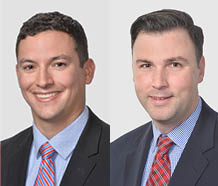Insights
By: Sharon B. Hearn and Lisa A. Durham
on May 18, 2020
When preparing this Alert, I recalled a presentation I did in 2008 called “Dealing with Down Times in an ESOP Company.” Well, here we are 12 years later, but the impact of the COVID-19 pandemic on many ESOP companies is even worse than the 2008…
By: Robert A. Greising and Corben A. Lee
on May 17, 2020
On Friday, May 15, 2020, the SBA published the Paycheck Protection Program Loan Forgiveness Application (“Application”) and Instructions. To access the Application and instructions please click here. The Application provides much needed guidance on…
By: Brett J. Ashton and Kyle P. Chambers
on May 17, 2020
On May 13, 2020 the Consumer Financial Protection Bureau (the “Bureau”) released a Statement on Supervisory Practices Regarding Regulation Z (the “Statement”) and two FAQs regarding the Bureau’s Payment and Deposits Rule (the “Payments and Deposits…
By: Robert A. Anderson and Hillary N. Buchler
on May 17, 2020
The Indiana Legislature passed House Bill 1004 which Indiana’s Governor signed into law on March 18, 2020. Section 8 of the Bill creates new law affecting physician noncompete agreements and physician separations and goes into effect on July 1,…
May 14, 2020
The concept of force majeure has garnered significant attention due to the social and economic impact of the novel Coronavirus (“COVID-19”) resulting in a reduction of operations or closure of businesses, factories, stores and restaurants across the…
By: Julie C. Bolling
on May 14, 2020
Under the Coronavirus Aid, Relief, and Economic Security Act (the CARES Act), the State of Indiana received a distribution of Coronavirus Relief Funds to be used for certain limited purposes. Three Hundred Million Dollars of these funds are being…
By: Christopher W. Bloomer and Robert S. Schein
on May 14, 2020
Beginning March 16, 2020, Indiana Governor Eric Holcomb issued a number of Executive Orders (“Orders”) easing statutory requirements concerning Indiana’s Open Door Law (“ODL”) and Access to Public Records Act (“APRA”) in light of the COVID-19…
By: and Fenton D. Strickland
on May 14, 2020
Overview
On May 12, 2020, the IRS issued Notice 2020-33, which (i) increases the carryover limit for flexible spending arrangements (“FSAs”) to $550, and (ii) clarifies the timing for reimbursement of individual health coverage premiums under certain…
By: , Alexander L. Mounts, and Sharon B. Hearn
on May 13, 2020
Overview
On May 12, 2020, the IRS issued guidance in response to the COVID-19 pandemic which provides flexibility during calendar year 2020 for employer-sponsored health coverage, health flexible spending arrangements (“FSAs”), and dependent care…
By: Robert A. Greising and Corben A. Lee
on May 12, 2020
[UPDATE MAY 13, 2020] - Welcome guidance was issued today by the Small Business Administration (SBA) in the form of FAQ #46 regarding a borrower’s certification of the necessity of a loan under the Paycheck Protection Program (PPP). The guidance…
By: and Alexander L. Mounts
on May 12, 2020
Overview
On April 29, 2020, the U.S. DOL, Treasury Department and the IRS issued deadline relief and other guidance to aid employee benefit plans and plan participants impacted by the COVID-19 pandemic. The guidance extends certain timeframes…
By: Kendall A. Schnurpel
on May 10, 2020
On May 8, 2020, the IRS released two new FAQs related to relief provided under the Coronavirus Aid, Relief, and Economic Security Act (“CARES Act”) designed to allow higher education institutions to use certain funds allocated by the Department of…
|











